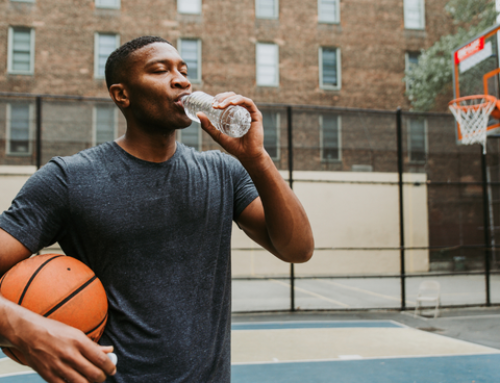How to Hydrate Your Body
Water plays an essential role in athletic performance by maintaining your body temperature (thermoregulation). If you are dehydrated, you risk impairing your performance, and, in extreme cases, causing serious health complications.
Hydration must be part of your daily plan, and you should specifically focus on fluid intake before, during and after training or competition.
Water makes up 45 to 70 percent of your body weight, so water is the perfect option for hydration. In fact, research shows that water affects athletic performance more than any other nutrient. However, it’s also important to replenish sodium, potassium and other electrolytes lost through sweat—especially if your workout exceeds 45 to 60 minutes and the intensity is high. This is particularly important if you are a heavy sweater—to prevent cramps and maintain your performance.
When you train outside, you have to pay even more attention to hydration to avoid potential heat-related illness. It’s best to drink a cool beverage (at least 50 to 70° F) to help reduce your body temperature. Also, cool beverages are absorbed more quickly than warm drinks. Learn more about fueling your body through STACK’s Hydration Guide.
Basic Hydration Guidelines for Athletes
- Start your day with a glass of cold water
- Don’t wait until you’re thirsty; drink 16 ounces of cold water at least two hours before a workout, practice or game, especially if exercise will be prolonged in a hot environment
- Make sure fluids are readily available; carry a water bottle with you whenever you’re away from home
- Drink before, during and after exercise
- During exercise, drink six to eight ounces of water or sip an electrolyte replacement beverage every 15 minutes
- Drink about one pint of fluid for every pound of body weight lost after exercise
- Avoid caffeinated and sugary drinks; caffeine can cause you to become dehydrated, and sugar can slow your body’s ability to absorb fluids
- Get your water by consuming fruits and vegetables
RECOMMENDED FOR YOU
MOST POPULAR
How to Hydrate Your Body
Water plays an essential role in athletic performance by maintaining your body temperature (thermoregulation). If you are dehydrated, you risk impairing your performance, and, in extreme cases, causing serious health complications.
Hydration must be part of your daily plan, and you should specifically focus on fluid intake before, during and after training or competition.
Water makes up 45 to 70 percent of your body weight, so water is the perfect option for hydration. In fact, research shows that water affects athletic performance more than any other nutrient. However, it’s also important to replenish sodium, potassium and other electrolytes lost through sweat—especially if your workout exceeds 45 to 60 minutes and the intensity is high. This is particularly important if you are a heavy sweater—to prevent cramps and maintain your performance.
When you train outside, you have to pay even more attention to hydration to avoid potential heat-related illness. It’s best to drink a cool beverage (at least 50 to 70° F) to help reduce your body temperature. Also, cool beverages are absorbed more quickly than warm drinks. Learn more about fueling your body through STACK’s Hydration Guide.
Basic Hydration Guidelines for Athletes
- Start your day with a glass of cold water
- Don’t wait until you’re thirsty; drink 16 ounces of cold water at least two hours before a workout, practice or game, especially if exercise will be prolonged in a hot environment
- Make sure fluids are readily available; carry a water bottle with you whenever you’re away from home
- Drink before, during and after exercise
- During exercise, drink six to eight ounces of water or sip an electrolyte replacement beverage every 15 minutes
- Drink about one pint of fluid for every pound of body weight lost after exercise
- Avoid caffeinated and sugary drinks; caffeine can cause you to become dehydrated, and sugar can slow your body’s ability to absorb fluids
- Get your water by consuming fruits and vegetables












